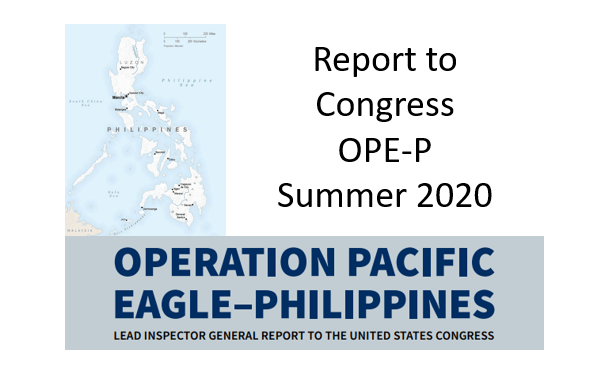
The Lead Inspector General report to the United States Congress on Operation Pacific Eagle – Philippines (OPE-P) is now available. The report covers the period of April 1, 2020 to June 30, 2020. OPE-P is the overseas contingency operation to support the Armed Forces of the Philippines (AFP) in their fight against ISIS-East Asia (ISIS-EA) and other terrorist organizations.
ISIS-EA. The Philippine faction of ISIS remains a threat in the Philippines. Its capabilities, size, financing, and operations has not changed in recent months. It continues to carry out sporadic, mostly small-scale attacks. ISIS-EA and other violent extremist groups have remained about the same size and strength over the last few years. These groups continue to operate in the southern Philippines where separatist groups and extremist groups have existed for decades. Over recent years there has been little progress in improving the economic, social, and political conditions in that part of the country.
Special Operations Command – Pacific. A key aspect of this report are the activities of Special Operations Command Pacific (SOCPAC). U.S. SOF have been active in the Philippines for decades. The theater special operations command continued with its advise and assist operations to the Armed Forces of the Philippines. U.S. advisors continued to share information with the AFP to develop target intelligence packages and provide ISR-related information about ISIS-EA to the AFP.
AFP’s Special Operations Command. U.S. military advisors continued to work with Philippine counterparts to support development of the AFP’s Special Operations Command. This is a unified combatant command similar to the U.S. Special Operations Command (USSOCOM). COVID-19 restrictions limited these many of these interactions to a series of virtual meetings to discuss acquisition processes and strategies.
11-Meter Boats for AFP. SOCPAC delivered two 11-meter rigid hull inflatable boats to the AFP’s Naval Special Operations Group through U.S. security cooperation programs. In addition, the Department of State has approved the potential sale of attack helicopters to the Philippine military.
COVID-19. SOCPAC reported that it held most leadership engagements and training events virtually – eliminating the risk of coronavirus transmission through person-to-person meetings. The TSOC also provided expertise, analytics, and information collection support to Philippine operates remotely as well. The pandemic had a negative impact on the amount of U.S. intelligence, surveillance, and reconnaissance (ISR) support provided to the AFP. In addition, the ability of U.S. forces to provide casualty evacuation support to the AFP was impacted by COVID-19.
Civil Affairs and COVID-19. Civil Affairs (CA) personnel were focused on the delivery of medical supplies and equipment to Philippine frontline healthcare professionals treating COVID-19 patients on the islands of Mindanao and Luzon (see map). In addition, other elements of the U.S. military delivered supplies to medical facilities throughout the Philippines.
The report also contains sections related to the U.S. government interagency efforts to combat terrorism in the Philippines, diplomacy and political developments, a revised Philippine government counterterrorism law, COVID-19 in the Philippines, humanitarian and USAID assistance, and more.
**********
Operation Pacific Eagle – Philippines: Lead Inspector General Report to the United States Congress, Department of Defense, August 7, 2020, 56-pages, PDF. Access the report online.